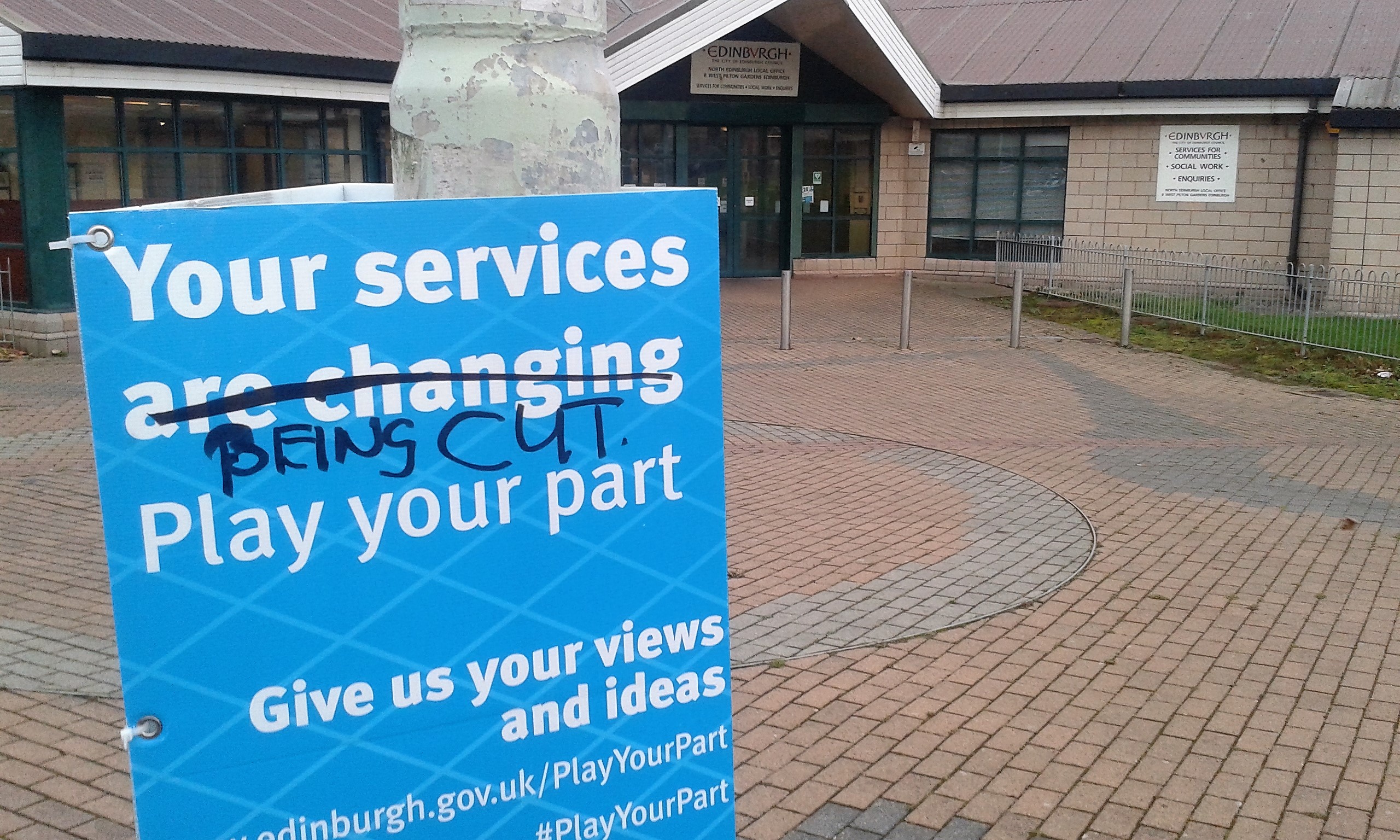I was saddened to hear of the death of former local councillor Neil Lindsay on Friday. Continue reading Neil Lindsay
Tag: local government
Council budget spending priorities to be scrutinised by Holyrood committee
The way in which local governments plan and spend their budgets is to be scrutinised by a Holyrood Committee. The Scottish Parliament’s Local Government and Communities Committee has today announced its review into local government spending ahead of its scrutiny of the Scottish Government’s draft budget 2018/19, which should be revealed towards the end of this year. Continue reading Council budget spending priorities to be scrutinised by Holyrood committee
All change for council committees
Yes folks, it’s Capital Coalition 2!
‘Stable leadership for the Council moving forward’ – Council Leader Cllr Adam McVey
The City of Edinburgh Council is to be run by an SNP and Labour coalition. SNP group leader Adam McVey (SNP) and Labour’s Cammy Day will sign the formal agreement later today, ending weeks of uncertainty. The capital has been without political leadership since last month’s council elections. Continue reading Yes folks, it’s Capital Coalition 2!
Testing times ahead for new councillors
New councillors elected in May face major challenges and need to focus on improving long-term planning, says the Accounts Commission.
In its 2017 overview published today, the local government spending watchdog outlines a long-term decline in Scottish Government real terms funding which makes up around 60 per cent of council income.
At the same time, there continue to be increasing pressures on services, particularly in social care and education which together account for over 70 per cent of council spending.
The report says councils overall have maintained or improved their performance in the face of these challenges. However, public satisfaction is declining and complaints are increasing. Looking ahead, they need to better involve their communities in service design and deliver.
There are wide variations between councils. Some have grasped the nettle in finding new ways to provide services more efficiently. Others have been slower off the mark. Councils have made savings by cutting jobs but half of them still don’t have organisation-wide workforce plans.
Councils must learn more from each other and collaborate better to improve services and reduce costs.
Councillors elected in May must have the necessary training and tools to do an increasingly complex job determining local priorities, overseeing delivery of essential services and working in partnership with other public bodies to improve outcomes for communities and individuals.
Ronnie Hinds, deputy chair of the Accounts Commission, said: “New councillors will require time to settle in and develop skills to make strategic plans, consider options for service delivery and scrutinise how well this is happening in practice.
“But they have four years ahead of them, and they need to plan effectively for the longer term, work with their communities to decide key priorities and then make that plan happen.
“We hope our report is helpful to councillors and officers as they strive to maintain or improve services for the public with reduced resources.”
The report: nr_170307_local_government_performance
The Scottish Greens have commented on the report. Andy Wightman, the Scottish Greens’ local government spokesperson, said:
“Audit Scotland is right to highlight these challenges. The Scottish Greens are committed to strengthening local democracy in Scotland and that’s why we led a debate on the subject only a few months ago. We will also be publishing proposals later this week on a fiscal framework that details how the financial relationship between Holyrood and local government can be improved.
“The six Green MSPs, who were elected on a manifesto pledge to campaign to devolve decisions and budgets to a more local level, will continue to call for councils to have more powers to implement new structures for local democratic participation.”
Councils spell out #BudgetReality
Local government umbrella body COSLA is to launch a social media campaign entitled #BudgetReality which will lay out in detail the real budget Councils have been given for next year. The campaign will also highlight the impact of this reduction in specific service areas. Continue reading Councils spell out #BudgetReality
COSLA: give us a break
It’s the blame game. Local government blames Holyrood for cuts to services. Holyrood blames Westminster. Westminster says it’s Holyrood’s fault – and so the cycle goes on. And on. And on. And while the various democratic structures pass the buck, communities continue to suffer – and, as ever, the poorest communities suffer most …
COSLA President Councillor David O’Neill said that Council Leaders had given COSLA a very clear message over the course of the last week that the Scottish Government have to treat local government fairly in tomorrow’s settlement announcement. Continue reading COSLA: give us a break
Council Cuts: Wightman says report shows need for autonomy
Andy Wightman MSP, Local Government spokesperson for the Scottish Greens, has highlighted a report showing the social impact of the 2016-17 local government budget. The MSP says the report highlights a need to re-address the way councils are funded.
The SPICe/Glasgow University/Heriot Watt University report shows most council expenditure is on services used by less affluent communities – services such as social work, public transport and citizen’s advice – but that most cuts have also landed on these services.
Andy Wightman, Local Government spokesperson for the Scottish Greens and MSP for Lothian, said: “Local authorities provide a lifeline for many communities struggling to make ends meet. Good quality education, social care, public transport, libraries and citizen’s advice are essential if we want a fair society.
“I welcome this new social impact methodology which, although not ideal, is very useful in understanding the impact of cuts to local government budgets.
“Ultimately this report shows the negative impact on local services from the Scottish Government’s cuts to council funding and underlines the need for a fiscal framework between the Scottish Government and local authorities and the need to scrap the Council tax and provide greater fiscal autonomy to local government.”
Education reforms: Putting teachers in charge
Decentralisation drives improvement plan
“Decision-making must rest with schools” – John Swinney
Empowering schools to take the decisions necessary to improve children’s attainment will be at the heart of reforms being consulted on in the Scottish Government’s governance review, Deputy First Minister John Swinney said today.
Mr Swinney will formally launch the review on Tuesday, setting out the goal of making schools the key decision makers on children’s education and consulting on how to make that a reality. The review will consider how to best decentralise management to schools and how best to support teachers and headteachers in exercising their new responsibilities.
The Deputy First Minister said: “Our relentless focus will be on how we can build on the many strengths in Scottish education to close the attainment gap and deliver excellence and equity in our schools. We believe that the key to achieving this for all children depends on the quality of teaching and the relationship between teachers and children. That is why we are taking forward our commitment to make schools, their teachers and parents, the key decision makers in a child’s education.
“We have already initiated a range of targeted actions to close the equity gap and reduce classroom workload, but we want to go further. We want to ensure that the whole education system in Scotland is focused on supporting teachers do what they do best – teaching our young people.
“Our starting point is schools must have the flexibility to take the decisions that matter for children’s education. The governance review I will publish this week will begin with the presumption that decision-making must rest with schools. This approach poses the question of how the rest of the system can support teachers, headteachers and parents in that extended role.
“It will also consider how we can involve parents and the wider community better in the life of schools, because we know that there is strong global evidence that greater parental and community involvement promotes children’s attainment and achievement.”
Thousands of vulnerable children may be losing out
Concern over ‘major disparities’ between local authorities
Thousands of Scottish children and young people with Additional Support Needs (ASN), such as those with learning difficulties, learning disabilities, autism and care experience, may not be getting the support they are entitled to according to a coalition of leading independent and third sector children’s services providers. Continue reading Thousands of vulnerable children may be losing out


















